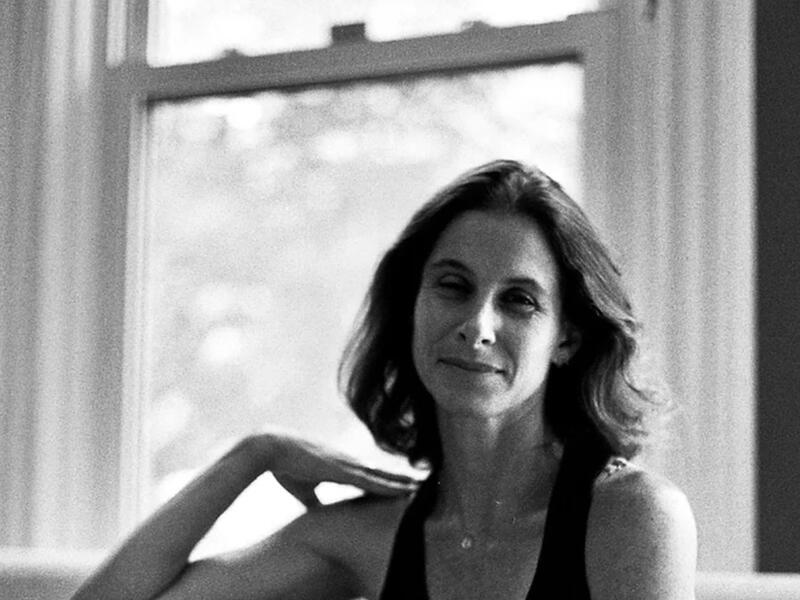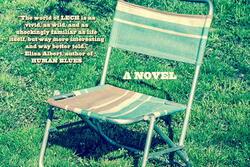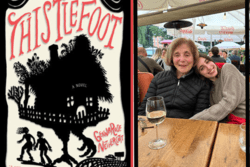Q & A With Author Sara Lippmann
JWA talks to author Sara Lippmann about suburbia as an irresistible setting for fiction, radical retellings of the Torah, and more.
This interview has been edited and condensed.
JWA: Your writing often examines American suburbia through a witty, cynical lens. What drew you to this literary setting?
Sara Lippmann: For most of my childhood, I grew up disgruntled and angst-ridden in the dank armpit of suburbia, and as much as I scowled through it at the time and could not wait to move away, it’s become fertile literary ground, a source of friction to push up against, a built-in metaphor. Suburbia as a stand-in for so much of what’s wrong with America makes it an irresistible setting. The smugness. The hypocrisy. The varying degrees of myopia (which, as a child of the ’80s, included racism, homophobia, antisemitism, etc.) The bottomless consumerism, the competition of want. The big cars, the fences, thy neighbor’s wife, the isolationism and conformity, and the persistent empty-headed refusal to look under the hood, so to speak. In general, I’m drawn to contradiction and paradox, to the quiet subversion of expectation, to a destabilization of the status quo. Those are all generative forces. Why are horror movies often set in suburbia? When menace topples the mirage of safety, narrative energy is born. Whatever lies in that disconnect is worth mining. In suburbia, the menace comes from within. Suburbia is terrifying. A powder keg. We are the goddamn danger.
JWA: Jerks, your second short story collection, features the piece “Rabbi Tales” about a young woman with a crush on her rabbi. I love how this story explores the recognizable ecosystem of the modern shul, particularly the intergenerational experiences of women. What made you decide to combine the spiritual and the sexual in this environment?
SL: Thanks so much for reading and connecting with that story.
I spent many years (as a camper, counselor, and much later, as an adult teacher) at a Jewish summer camp, and I’ve always found the hierarchical reverence paid to “The Rabbi” both hilarious and infuriating, even as I’ve been susceptible to it. I was on teaching staff with a bunch of rabbis. Camp was run by a rabbi, who would impart his weekly insight from on-high. There have been rabbis around me my whole life. I have always been troubled by the righteousness, the presumed holiness of spiritual leaders as better than the rest of us, even as I have subscribed to it. Cue the contradictions, the friction born from these opposing forces that often inform my work.
As for spiritual and sexual yearnings, they stem from the same imperative: want, pure and simple. Maybe it’s reductive, but desire is the universal driver. What do we want? We are looking for enlightenment, fulfillment, to be made whole—a ridiculous, impossible notion, and one the kabbalah teaches is unachievable, like trying to put back together that smashed glass. Instead, it is the incompleteness, the interminable lack that makes us, which still never stops us from wanting, striving. Even now, though I am not a member of a synagogue, I am regularly brought to tears by clerical sermons. Which is to say—who isn’t yearning? I would also argue this want goes both ways. Men of the cloth are put on a pedestal, regardless of religious affiliation. It’s the nature of the job description. I am equally suspicious of and intrigued by rabbis, especially those my age and younger. (In the same way I question the purported safety of suburbia, I doubt the holiness of clergy.) The specificity of such a calling, the hubris, the buy-in required (and the narcissism) to inhabit the role of spiritual leader. The embedded power. A presumably selfless job can also be incredibly self-serving. The rabbi, of course, has their own wants—to be adored, to wield influence, and so on.
JWA: You’re the co-editor of Smashing the Tablets: Radical Retellings of the Hebrew Bible, forthcoming from SUNY Press. Tell us more about this project and why it speaks to you.
SL: This project is the brainchild of the brilliant writer and academic Seth Rogoff, who invited me on board as co-editor a few years ago when the idea was still on the ground, and it’s been a thrill to help usher it into shape. Smashing appeals to me for many of the same reasons behind “Rabbi Tales”: to confront power structures and upend hierarchy, as both a nod to tradition and destabilizing force, to make room for new perspectives, untold stories, to wrestle directly with the undeniable richness and layered nature of the text.
My childhood bedroom shared an extremely thin wall with my father’s study, and every week I’d listen to him practice trope for the upcoming parsha [weekly Torah portion]. The Torah, for better and for worse, is an inextricable part of me, of all of us. Rather than turning my back on the book for its punitive and deeply problematic moral code, or simply swallowing what’s written or regurgitated by some sleepy rabbi in an uninspired d’var [sermon], it’s our duty to confront it. To interpret. To make our own sparks.
Recently, at a b’mitzvah at Park Slope Jewish Center, a rabbi I love (who is also a friend), Carie Carter, said the Torah is walked through the congregation before it’s undressed as an invitation for every person to engage. It’s that spirit of inclusivity that steered our stellar table of contents. All of our contributors have taken on a section of the Tanakh for radical engagement. What radical is, and what this looks like, varies widely. Some have retold stories in present day, others have fleshed out formerly sidelined characters, and some have even tackled the thorny nature of translation itself. They have played with language, exploded form. The pieces are tremendous. The book is currently slated for fall 2024.
JWA: As a mentor to writers of all ages through the Writing Co-lab and other organizations for the past twenty years, what is the most valuable part of that work?
SL: Writing is so solitary and so riddled with self-doubt (for me, at least, anyway). Toiling away in isolation, we are deep in our heads, which is necessary, but our heads can mess with us. We can get in our own way and interfere with the process; in short, we are often our own worst enemy. (And by we, I mean me, obviously). This is all just my own bullshit: I know what it’s like to self-sabotage. I know what it’s like to let your darkest fears derail a project, or to deny yourself the chance to jumpstart that project because “Who am I?” and so on. I know what it’s like to find yourself flailing in the dark, murky waters of the middle of a book, a long unwieldy story, etc. As a mentor, all I can offer is a hand. Those feelings—that doubt—comes with the territory. The trick is perseverance. I think about that Bernadette Mayer poem, “The Way to Keep Going in Antarctica.” I’ll even say to myself, Be strong, Bernadette.
All we can do is own our shit. Whether that takes the form of voice or subject matter or both or a third thing, that’s all we’ve got—our singular lens through which we experience the world. This sensibility is the stuff that shapes us and our work. If I can help a writer get closer to embracing the particularities of their own selves, then I’ve done my job. To teach them both to trust their instincts —and also to second guess them—and to become more comfortable with the innate tension between those two poles. I’ve seen teachers squelch dreams, and I’ve seen teachers blow smoke, and I’ve seen teachers issue bald indifference. None of that is helpful. What’s helpful is the reminder that we are all students of craft, and what we must do is practice it. All we can do is face the page, face another day with humility and curiosity. If we can silence the noise, whether it's social media nonsense or our own monkey minds, we can get to the heart of the matter, where emotional honesty lives and breathes.
The most valuable part of teaching is watching writers recommit to their work every day. There is no shortcut. One word, then the next. As mentors, as teachers, we can offer assurance that they are not alone. Because therein lies another inherent contradiction. In order to be true to our work, we need to go forth as if there is no one watching, no one reading; yet, to make art in a vacuum is masturbatory. The connection with a reader is part of what makes it all worth it. I am one reader.
JWA: Lech, your most recent book, is a novel, following two award-winning short story collections. What is the biggest difference between writing long- and short-form prose, and what made you decide to pursue a full-length novel?
SL: When I had the first seedling of an idea for what would become Lech (a voyeuristic tale, in which a man rents out his property and does not leave) many, many years ago, it felt vaguely novelistic. Maybe that sounds hokey, but I feel like the stories themselves dictate their containers. Because I see myself primarily as a short story writer, I was promptly hit with a debilitating case of imposter syndrome, which led to my putting it off, denying it, etc., hoping this odd little itch would resolve on its own. It didn’t.
Once I embarked on the project, it was a steep learning curve, an exercise in stamina, among other things. (Around that time I started running, and the endurance I began to build on my feet began to spill over onto the page.) For one, I had to become comfortable with discomfort—climbing hills, so to speak—not knowing where I was going; with not seeing anywhere close to the end, and to trust in that process. I had to resist the frightened impulse to oversteer the narrative, to loosen my hold on the reins. With short stories, particularly with flash fiction, you can get in and get out quickly, but that doesn’t fly with novels, so I had to teach myself to linger, loiter, languish in the scenes. I had to check the impulse to sideline a lot of the dramatic action, which perhaps is lazy, but is something you can get away with in a story. In a novel, or rather in my novel, this felt flaccid. So I had to learn to embrace action, to contend with market-driven terms like “stakes” and “propulsion,” and to make peace with where my book landed.
Sure, perhaps I started the book because of an idea that kept nagging at me, but as a great abandoner of projects, I was determined to challenge myself to see this baby through. It can be tempting to slide into a rhythm, and I wanted to resist that complacency (as the running influencers say: what doesn’t challenge you doesn’t change you). Last, whenever I encountered that failure of nerve, I would cheat on the novel with stories, and funnel that fresh energy back into the manuscript. I cheated so much that I managed to belch out my collection, Jerks, in the interim. So it took me a while, but I never would have finished Lech if I hadn’t transgressed.
JWA: In a 2022 essay for Catapult, you talk about your “nice Jewish girl” upbringing and how fiction writing provided an opportunity for “wildness” (all inspired by Dirty Dancing, of course!) Do you consider the act of writing a form of escapism, or is it the content of the stories that provide the means of escape?
SL: I’m not sure I’d call it an escape, especially when the writing wrestles with the overwhelming garbage of life. If anything, it’s confrontation. Confrontation through the imagination. Lech is a novel about predation, one that explores the predatory impulses of human nature, written over the election years predating the Trump administration, then through the Trump years, Kavanaugh hearings, Black Lives Matter, #metoo, the opioid epidemic, rises in antisemitism. I often had to fight through an overwhelming sense of despair and futility to not give up. Writing was a way to funnel some of those feelings, the fury and frustrations, to push up against patriarchal double standards, to rage against the machine. So no, it’s not an escape. But once unleashed, the imagination does take me to places I do not go in my so-called “real life.” Maybe that means my fiction is more emotionally honest than my ordinary days.
JWA: Do you have any advice for writers who want to explore their Jewish identity through fiction?
SL: It’s funny: a lot of my work is not at all what one might call “Jewish.” I don’t always take on Jewish content, at least not directly, as I did with my novel, in which I was deliberately confronting certain tropes of the Jewish canon, and exploring the idea of “Lech-lecha.” But even my stories that haven’t a drop of typically Jewish-related content still embody my sensibility, my way of seeing the world, the ear with which I hear language, the rise and fall, the idioms and syntax, the frenetic interruption—the neurosis!—and perhaps more than anything the steady tug between grief for the past and anxiety toward the future, which feels somehow Jewish to me. If you buy into the idea of sounding like yourself, and if your Jewishness is a part of who you are to whatever extent (and yes, we contain multitudes, as it need not be a pigeonholing factor) however consciously or subconsciously, then that naturally will infuse the perspective. I don’t know if it's anything to overthink. Being too conscious about it can lead to contrivance or sentimentality. So I guess what I’m saying is the only way to get out of our own way is to be the way, so help us all.







